Simoncube
On this page, you find all documents, package deals, and flashcards offered by seller simoncube.
- 255
- 0
- 4
Community
- Followers
- Following
259 items
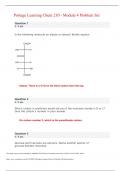
Portage Learning Chem 210 - Module 4 Problem Set
Portage Learning Chem 210 - Module 4 Problem Set Is the following molecule an aldose or ketose? Briefly explain. ketose. There is a C=O on the third carbon from the top. Which carbon in erythrose would tell you if the monosaccharide is D or L? Give the carbon’s number in your answer. On carbon number 3, which is the penultimate carbon. Glucose and mannose are epimers. Name another epimer of glucose besides mannose. Galactose. ...
- Exam (elaborations)
- • 7 pages •
Portage Learning Chem 210 - Module 4 Problem Set Is the following molecule an aldose or ketose? Briefly explain. ketose. There is a C=O on the third carbon from the top. Which carbon in erythrose would tell you if the monosaccharide is D or L? Give the carbon’s number in your answer. On carbon number 3, which is the penultimate carbon. Glucose and mannose are epimers. Name another epimer of glucose besides mannose. Galactose. ...
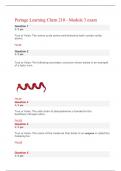
Portage Learning Chem 210 - Module 3 exam
Portage Learning Chem 210 - Module 3 exam True or False: The amino acids serine and threonine both contain sulfur atoms. FALSE True or False: The following secondary structure shown below is an example of a beta- turn. FALSE True or False. The side chain of phenylalanine is bonded to the backbone nitrogen atom. FALSE True or False: The name of the molecule that binds to an enzyme is called the holoenzyme. FALSE True or False: An inhibitor ...
- Exam (elaborations)
- • 16 pages •
Portage Learning Chem 210 - Module 3 exam True or False: The amino acids serine and threonine both contain sulfur atoms. FALSE True or False: The following secondary structure shown below is an example of a beta- turn. FALSE True or False. The side chain of phenylalanine is bonded to the backbone nitrogen atom. FALSE True or False: The name of the molecule that binds to an enzyme is called the holoenzyme. FALSE True or False: An inhibitor ...
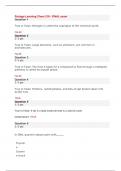
Portage Learning Chem 210 - FINAL exam
True or False: Nitrogen is called the superglue of the chemical world. FALSE True or False: Large elements, such as strontium, are common in biomolecules. FALSE True or False: The time it takes for a compound to flow through a metabolic pathway is called the payoff phase. FALSE True or False: Proteins, carbohydrates, and fats all get broken down into acetyl-CoA. TRUE True or False: A fat is a lipid molecule that is a solid at room temperature. TRUE In DNA, guanine...
- Exam (elaborations)
- • 18 pages •
True or False: Nitrogen is called the superglue of the chemical world. FALSE True or False: Large elements, such as strontium, are common in biomolecules. FALSE True or False: The time it takes for a compound to flow through a metabolic pathway is called the payoff phase. FALSE True or False: Proteins, carbohydrates, and fats all get broken down into acetyl-CoA. TRUE True or False: A fat is a lipid molecule that is a solid at room temperature. TRUE In DNA, guanine...
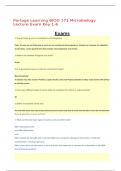
Portage Learning BIOD 171 Microbiology Lecture Exam Key 1-6
Portage Learning BIOD 171 Microbiology Lecture Exam Key 1-6 Exams 1. What are the two major types of nucleic acids and their roles? DNA- deoxyribonucleic acid RNA- Ribonucleic acid DNA- Cellular life has DNA and a role that DNA has is long-term storage of information, it holds the characteristics of living organisms. RNA- Is the carrier of information in form of amino acid sequence. It converts the information in the DNA and synthesizes proteins Tru...
- Exam (elaborations)
- • 28 pages •
Portage Learning BIOD 171 Microbiology Lecture Exam Key 1-6 Exams 1. What are the two major types of nucleic acids and their roles? DNA- deoxyribonucleic acid RNA- Ribonucleic acid DNA- Cellular life has DNA and a role that DNA has is long-term storage of information, it holds the characteristics of living organisms. RNA- Is the carrier of information in form of amino acid sequence. It converts the information in the DNA and synthesizes proteins Tru...
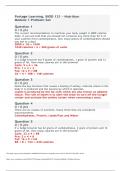
Portage Learning. BIOD 121 – Nutrition Module 1 Problem Set
The current recommendation to maintain your body weight is 2000 calories daily. If you are told that you should not consume any more than 52 % of your calories from carbohydrates, how many grams of carbohydrates should you eat in a day? 2000 x .52 = 1040 1040 calories / 4 = 260 grams of carbs If a fudge brownie has 9 grams of carbohydrates, 1 gram of protein and 12 grams of fat. How many calories are in the brownie? Carb: 9 x 4 = 36 Pro: 1 x 4 = 4 Fat: 12 x 9 =108 36 + 4 + 108 = 148 c...
- Exam (elaborations)
- • 6 pages •
The current recommendation to maintain your body weight is 2000 calories daily. If you are told that you should not consume any more than 52 % of your calories from carbohydrates, how many grams of carbohydrates should you eat in a day? 2000 x .52 = 1040 1040 calories / 4 = 260 grams of carbs If a fudge brownie has 9 grams of carbohydrates, 1 gram of protein and 12 grams of fat. How many calories are in the brownie? Carb: 9 x 4 = 36 Pro: 1 x 4 = 4 Fat: 12 x 9 =108 36 + 4 + 108 = 148 c...
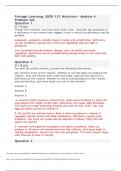
Portage Learning, BIOD 121 Nutrition – Module 4 Problem Set
Choose two minerals, one from each major class. Describe the symptoms of a deficiency in the mineral and suggest a way in which the deficiency may be avoided. potassium- symptoms include muscle cramps and arrhythmias. Deficiency can be avoided by eating more fruits and vegetables that are high in potassium. iron- symptoms include anemia, fatigue, poor circulation and temp regulation. Deficiency can be avoided being eating variety of red ,eats and dark leafy greens. For each fat soluble vi...
- Exam (elaborations)
- • 4 pages •
Choose two minerals, one from each major class. Describe the symptoms of a deficiency in the mineral and suggest a way in which the deficiency may be avoided. potassium- symptoms include muscle cramps and arrhythmias. Deficiency can be avoided by eating more fruits and vegetables that are high in potassium. iron- symptoms include anemia, fatigue, poor circulation and temp regulation. Deficiency can be avoided being eating variety of red ,eats and dark leafy greens. For each fat soluble vi...
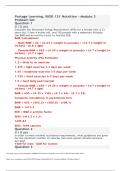
Portage Learning, BIOD 121 Nutrition – Module 3 Problem Set
Calculate the Estimated Energy Requirement (EER) for a female who is 23 years old, 5 feet 4 inches tall, and 130 pounds with a sedentary lifestyle. Use BMR and an activity factor to find the EER. BMR Calculations: Male BMR = 66 + (6.23 x weight in pounds) + (12.7 x height in inches) - (6.8 x age) Female BMR = 655 + (4.35 x weight in pounds) + (4.7 x height in inches) - (4.7 x age) Physical Activity (PA) Estimates 1.2 = little to no exercise 1.375 = light exercise 1-3 days per week 1.55 =...
- Exam (elaborations)
- • 5 pages •
Calculate the Estimated Energy Requirement (EER) for a female who is 23 years old, 5 feet 4 inches tall, and 130 pounds with a sedentary lifestyle. Use BMR and an activity factor to find the EER. BMR Calculations: Male BMR = 66 + (6.23 x weight in pounds) + (12.7 x height in inches) - (6.8 x age) Female BMR = 655 + (4.35 x weight in pounds) + (4.7 x height in inches) - (4.7 x age) Physical Activity (PA) Estimates 1.2 = little to no exercise 1.375 = light exercise 1-3 days per week 1.55 =...
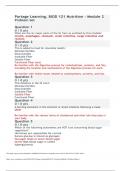
Portage Learning, BIOD 121 Nutrition – Module 2 Problem Set
What are the six major parts of the GI tract as outlined by this module? mouth, esophagus, stomach, small intestine, large intestine and rectum This is added to food for intestinal health: Monosaccharides Disaccharides Insoluble Fiber Soluble Fiber Functional Fiber (ans) Be familiar with the digestive process for carbohydrates, proteins, and fats, including the location and mechanisms of the digestion process for each. Be familiar with health issues related to carbohydrates, proteins, ...
- Exam (elaborations)
- • 5 pages •
What are the six major parts of the GI tract as outlined by this module? mouth, esophagus, stomach, small intestine, large intestine and rectum This is added to food for intestinal health: Monosaccharides Disaccharides Insoluble Fiber Soluble Fiber Functional Fiber (ans) Be familiar with the digestive process for carbohydrates, proteins, and fats, including the location and mechanisms of the digestion process for each. Be familiar with health issues related to carbohydrates, proteins, ...
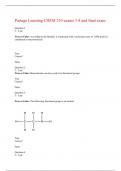
Portage Learning CHEM 210 exams 1-8 and final exam
Portage Learning CHEM 210 exams 1-8 and final exam Question 1 3 / 3 pts True or False: According to the Module, a compound with a molecular mass of 1,000 g/mol is considered a macromolecule. True Correct! False Question 2 3 / 3 pts True or False: Biomolecules can have only two functional groups. True Correct! False Question 3 3 / 3 pts True or False: The following functional group is an alcohol. True Correct! False Question 4 3 / 3 pts True or False: In ...
- Exam (elaborations)
- • 124 pages •
Portage Learning CHEM 210 exams 1-8 and final exam Question 1 3 / 3 pts True or False: According to the Module, a compound with a molecular mass of 1,000 g/mol is considered a macromolecule. True Correct! False Question 2 3 / 3 pts True or False: Biomolecules can have only two functional groups. True Correct! False Question 3 3 / 3 pts True or False: The following functional group is an alcohol. True Correct! False Question 4 3 / 3 pts True or False: In ...
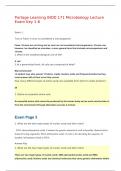
Portage Learning BIOD 171 Microbiology Lecture Exam Key 1-6
Portage Learning BIOD 171 Microbiology Lecture Exam Key 1-6 Exam 1. True or False: A virus is considered a microorganism. False. Viruses are not living and as such are not considered microorganisms. Viruses can, however, be classified as microbes, a more general term that includes microorganisms and viruses. 2. What is the smallest biological unit of life? A cell. 3. At a generalized level, all cells are comprised of what? Macromolecules* *A student may also answer: Proteins,...
- Exam (elaborations)
- • 34 pages •
Portage Learning BIOD 171 Microbiology Lecture Exam Key 1-6 Exam 1. True or False: A virus is considered a microorganism. False. Viruses are not living and as such are not considered microorganisms. Viruses can, however, be classified as microbes, a more general term that includes microorganisms and viruses. 2. What is the smallest biological unit of life? A cell. 3. At a generalized level, all cells are comprised of what? Macromolecules* *A student may also answer: Proteins,...
